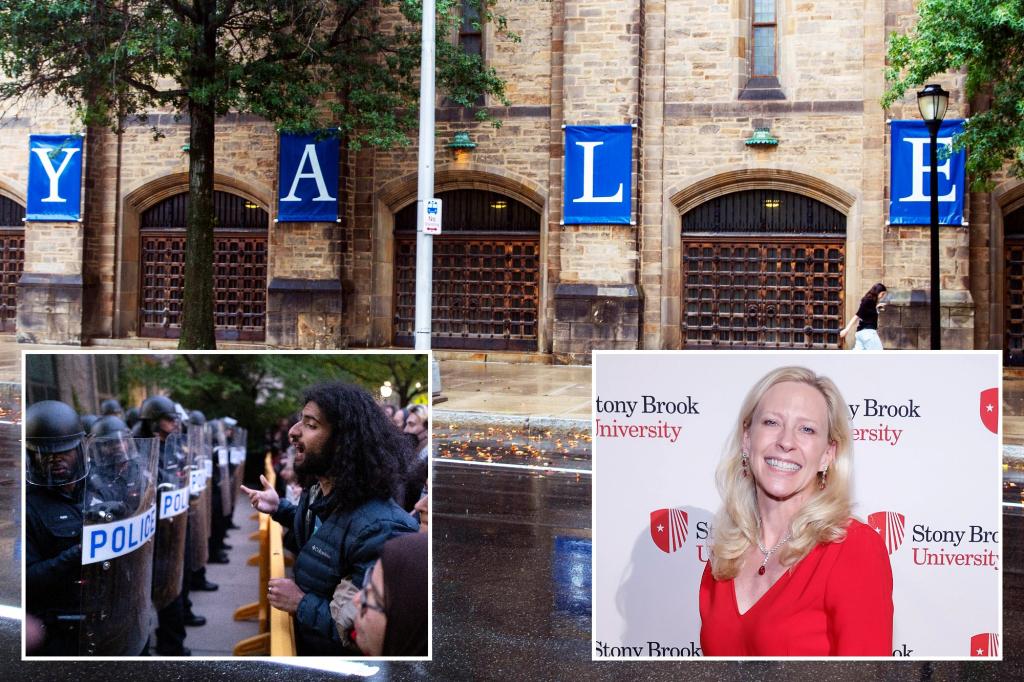Yale has decided to kill its “institutional voice” and quit issuing statements on controversial issues.
After years of making statements on hot-button topics from abortion to Black Lives Matter, the Ivy League school will adopt a standard of “institutional neutrality,” in a bid to stay out of the culture wars.
University president Maurie McInnis announced Wednesday the school would keep its mouth shut and “refrain from issuing statements concerning matters of public, social, or political significance, except in rare cases.”
It’s about time.
Who cares what a college as a collective thinks about the latest election results or faddish protest cause? And since when is it up to a college president to speak for everyone in the community, assuming they’re all on the same page? What ever happened to diversity of opinion?
Yale made the right move — and it’s time for other colleges to follow suit.
McInnis appointed a Committee on Institutional Voice to determine what — if any — stances the school should take on current events and, after seven weeks of meetings, the committee concluded: just about none.
What schools should and shouldn’t opine about came into sharp focus in the wake of Hamas’ October 7th terror attack on Israel. Many colleges and universities remained uncharacteristically silent, hesitating to condemn the atrocities that took place for fear of agitating campus activists.
This selective silence, understandably, left many Jewish students feeling abandoned.
“When leaders speak on one issue but not others, some members of the community may feel marginalized on the ground that their concerns have been overlooked while others’ have not,” Yale’s committee noted in their report.
At Yale, former president Peter Salovey did ultimately release a carefully worded statement entitled “War in the Middle East” on October 10, 2023.
But the committee is absolutely right that universities around the country fumbled the ball when it came to releasing statements about October 7th, if they even did so at all.
Analysis from Stanford researchers found 49% of schools that released statements about October 7th ultimately released followup statements walking back or apologizing for their original ones. Only 13% of the statements even referenced antisemitism.
Of course, colleges and universities shouldn’t be expected to take institutional stances in the first place… after all, institutions don’t have opinions, they are full of people who each have their own opinion.
But they cornered themselves into an unwinnable situation because their track record is so laughable. Their silence was so revealing precisely because colleges couldn’t stop making statements in the past.
At Yale, former president Peter Salovey made a grave statement to the whole community entitled “In memory of George Floyd” in May of 2020, declaring his death “a national emergency” as protests were rocking cities across America.
Nationwide, more than 200 colleges made statements mentioning Floyd’s name.
After the Supreme Court overruled Roe v. Wade, the Dean of Yale’s Divinity School released a statement, asserting that “there is no biblical basis for the ban on abortion.”
Harvard’s Medical School also released a statement upon the news, saying they are “devastated and concerned over the Supreme Court’s ruling.”
The presidents of Cornell, Harvard, and Wesleyan were among the countless school leaders to vociferously condemn former president Trump’s ban on immigrants from several majority Muslim countries in 2017.
When Kyle Rittenhouse was acquitted for shooting two protestors during a Black Lives Matter rally in Kenosha, Wisconsin, in 2021, a dean at Princeton wrote an email to the School of Public and International Affairs offering psychological counseling resources and lamenting, “My heart feels heavy as I write this.”
The president of the New School wrote to his community that the verdict was evidence of “vigilantism in the service of racism and white supremacy.”
At NYU, a DEI administrator suggested students might be so impacted by the news of Rittenhouse’s acquittal that they shouldn’t be required by professors to turn their cameras on during Zoom classes.
What do Zoom cameras have to do with a court ruling… halfway around the country?
And, more generally, what business do these administrators have weighing in on touchy topics on behalf of all community members? What difference does it make what a dean thinks about Kyle Rittenhouse or the abortion debate?
The self-importance of these self-appointed communal spokespeople is laughable.
The University of Chicago didn’t find itself in a PR mess like other schools this fall because it has long embraced a tradition of neutrality stretching back to the 1960s. Consistent silence is far preferable to selective silence.
The fact that other schools are now finally coming to that same realization due to the war in Gaza is revealing for its political expediency. But it’s a step in the right direction.
A movement is underway. Just this week more than 100 Duke faculty petitioned the school to adopt institutional neutrality. Stanford, the University of Pennsylvania, and the University of Virginia are among a growing list of colleges who have done so already just this fall.
It’s time colleges recognize a truth: no statement can encompass all the voices, opinions, and perspectives on campus. After all, isn’t debate and constructive disagreement the whole point of a liberal education?
President McInnis put it well in her statement: “We have a responsibility to grapple with a breadth of perspectives and ideas, some of which may make us uncomfortable. There will not always be consensus, nor should there be.”
Read the full article here

